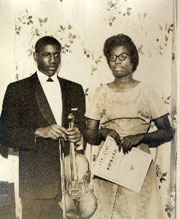![]()
Albert Roussel's 1929 Trio juxtaposes sprightly neoclassicism with more enigmatic, impressionistic streams. Flutist Fenwick Smith, violist Marcus Thompson, and cellist (and BCMS artistic director) Ronald Thomas had their own fascinating counterpoint: Smith's pearly tones contrasted with Thompson's sleek elegance and Thomas's wiry, taut timbre. The combination bore uncanny fruit in the second movement, a nocturnal stroll that, for all its placidity, passes through some eerie places.
Matthew Guerrieri,
The Boston Globe
![]()
"Life lived forward," it is said, "is better understood by looking backward." Probably just beyond the half way point of a professional chamber music career, I see that many earlier experiences with family, friends and colleagues prepared me for the unanticipated and unexpected.
My parents were born, each orphaned, and raised by others in Mississippi and Louisiana in the early 1900s when social, educational and material deprivations were all that appeared on their local horizons. They met at church in Texas in the 1940s and their relationship fed and grew on the common desire to create for their children's lives what had been denied to them; lives filled with family, opportunity and music. As part of the great Northward migration of Black Americans they arrived in the New York area where my sister and I were born. (The doctors told my parents that with hands like mine I would be either a doctor or a musician.) Within six years I was taking violin lessons and performing with my piano-playing sister. Music was constantly heard in our home; my parents sang together and later my sister and I joined in a family vocal quartet, improvising four-part harmony around familiar songs and hymns. A men's gospel quartet in which my father sang tenor, often rehearsed in our living room.

Marcus and Lonieta Thompson (Cornwall)
As players, my sister and I excelled on our instruments and in our love for music without any thoughts about what this might mean in the larger world. With the advice of caring Junior High School teachers, we were admitted to special high schools in New York where she was introduced to the French Horn and I to the viola and to chamber music. In my first year at the high School of Music and Art, I was appointed violist of the Senior String Quartet where I played, heard and really loved my first chamber music, a Mozart Quartet. The role of the viola, as 'member of a family' in chamber music, is quite different from the role of 'hero-soloist' that most young violinists aspire to by training and repertoire. While I relished the emotional intimacy of being in the middle of the texture, the relating and supporting that define the violist's lot, as a gangly teen, I was also physically much more comfortable on the larger instrument.
I went through Juillliard, like countless others, not knowing how my playing would be received in the real world. Conventional wisdom placed the viola player inside orchestras or quartets and rarely on stage as soloist. In any prior universe these moves meant closing the door to any career in chamber music. Fortunately that universe was about to change.
With the opening of New York's Chamber Music Society of Lincoln Center in 1969 (based on concerts presented at Spoleto's Festival dei due Mondi in Italy) a new opportunity for presenting and performing chamber music by a 'dream-team' of individuals was born. CMSLC brought to winter subscription artists not in fixed groups and who might only be assembled for summer festivals and galas. I was fortunate to be engaged by the Society as a guest for nearly ten years. One of my earlier tour performances was Tchaikovsky's Souvenir de Florence on the Celebrity Series in Boston's Jordan Hall. Individuals from that Society and others took that CMSLC example in two directions: creating more summer festivals for chamber music and more chamber music societies in major cities; a new and exciting career path in chamber music performance had opened.
No longer forced to choose between which career to follow, I pursued the 'hero-soloist' path that took me to major orchestras around the country and beyond but also returned to the nurture and support of the familial role among a growing list of similarly minded colleagues, which include my fellow members of the Boston Chamber Music Society.
Beyond the concert stage I have been a teacher of chamber music groups for more than forty-one years; first, at The Juilliard School and currently as Robert R. Taylor Professor of Music at MIT. I served for two years on the board for Chamber Music America soon after its founding and as a member of the Artist Advisory Committee for the Seattle Chamber Music Society.
Not to be outdone, my sister, Lonieta Cornwall, received her doctorate from Columbia University and serves as Professor of Music at Shaw University in Raleigh, NC. She also serves on the Raleigh Chamber Music Guild.
From the Boston Chamber Music Society
Silver Jubilee Commemorative Book